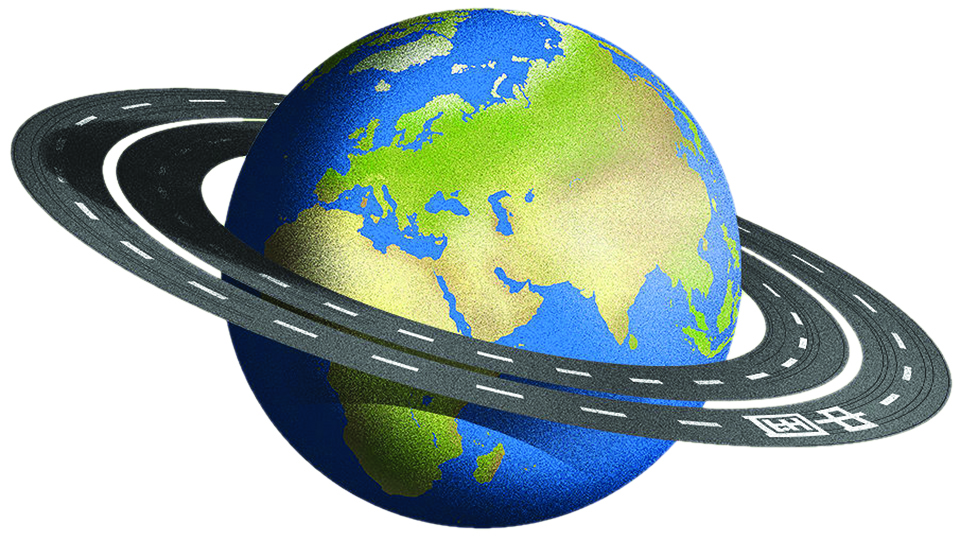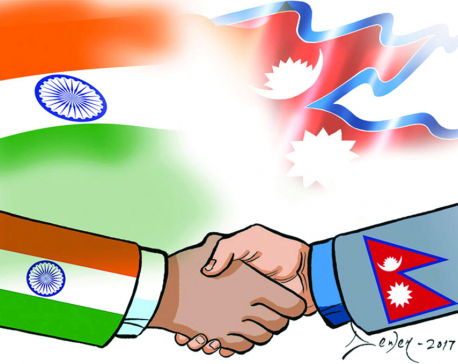
OR

From Zambia to Sri Lanka to Malaysia to Pakistan, everyone is talking about BRI debt trap. How can Nepal blindly accept BRI projects?
In the post Cold War era, the study of new pattern of conflict was primarily prescribed under special project of John M Olin Institute of Strategic Studies of the Harvard University. The project was called ‘Changing Security Environment and American National Interest.’ Professor Samuel Huntington later built on it and came up with the idea of clash of civilizations.
As the countries with distinct religions, culture and language of their own within their civilizations, China and India also have differences on many fronts, including on their policies in Asia. Unlike their Western counterparts, these eastern countries do not aggressively promote religion and faith or make others adopt it. But the Westerners evoke clash of civilization to destabilize and weaken Asia. The ‘divide and rule’ policy the Western powers exercised during the colonial period was one attempt to erode eastern civilization.
Today China, the emerging global power, is the major rival of the West because China is coming up in a big way. Through its Belt and Road Initiative (BRI), the country is trying to penetrate to not only parts of Asia and Africa but also reach as far as Europe and America. BRI is China’s policy to reach every part of the world.
But BRI also, at times, seems to be guided by the philosophy that once guided British, French, Portuguese and Spanish colonial rule. Thus China could emerge as a neocolonial power in new world order. New rivalry has started not only between the Western and Eastern powers but also within the powers in Asia. The western powers are doing all they can to stop their influence from waning in South Asia. The anxiety of the West over BRI and China’s rising status is reflected in reports of the Western press or the media that support the West.
The BRI anxiety
The Economist recently reported under the headline “The perils of China’s “dept-trap diplomacy.” Malaysian new Prime Minister Mahathir Mohammad has been quoted as challenging his predecessor’s Nazib Razak decision to allow Chinese Tech giant Alibaba to build Digital Free Trade Zone near Kuala Lumpur airport. Mahathir sensed Chinese intention to bring Malaysia under debt trap and therefore he cancelled USD 20 billion east-coast rail link under BRI, the report claims. Mahathir then said “sorry” to China on BRI, says the report.
Another report in The Asia Times states that the weak countries like Pakistan, Maldives and Sri Lanka soon joined BRI expecting big returns but they are realizing their mistakes now. The report explicitly mentions BRI as “new form of colonialism.” It also presents BRI as a strategy to ensure presence of Chinese military in the BRI project sites in the name of security. The Chinese support through BRI could very well become a trap for the host country, suggests the report.
In Daily Rant Ghana Richard Krah writes about Chinese investment in Zambia. He compares signing a contract with China with boiling frog effect story. This is related to the fable of a frog being boiled alive slowly. If it is put on boiled water, it will instantly die but if it is put on the water and slowly boiled, then it will die slowly as water gradually warms. He argues China is re-colonizing Africa appealing to the ignorance and selfish interest of the leaders.
Asian scene
Besides lending more than USD 57 billion for China-Pakistan Economic Corridor (CPEC), China has offered Pakistan extra USD 9.66 billion few days back, in addition to USD 16.4 billion in May 2017 and over USD five billion in this fiscal.
The timing of these loans has raised suspicion since it comes in the wake of regime change in Pakistan. Meanwhile, there are also the reports of Pakistani minister for commerce, industry and investment asking to suspend all projects under CPEC. Other reports claim that Prime Minister Imran Khan wants “the whole CPEC to be reviewed.”
In fact, the new government in Pakistan suspects that the government of Nawaj Sharif granted too favorable terms to China by undermining Pakistani interests.
Thus it is really difficult to say what China really intends to do with Asia and rest of the world with BRI. There are more suspicions than assurances. Sri Lanka had to give Hambatota port on lease to China for its inability to pay back Chinese loan.
From Zambia to Sri Lanka and from Malaysia to Pakistan, everyone is talking about BRI debt trap. In this context, how can the government of Nepal blindly accept Chinese loans for BRI projects?
Nepal must discuss debt issues seriously. We need to make it a public discourse. Let us ensure that while we develop big infrastructures, we also do not become bankrupt.
The author is a security and strategy scholar
You May Like This

Debating BRI
Nepal needs to mainstream the BRI debate and analytically distinguish its pros and cons for Nepal’s long-term economic growth, political stability... Read More...

Federalism: learning by doing
Issues have emerged regarding effective implementation of federalism. But there is a long way to go and these issues can... Read More...

Time to replace
Replacing 1950 treaty with new pragmatic agreement will best serve interests of both Nepal and India and strengthen their bonds Read More...




Just In
- Insurers stop settling insurance claims after they fail to get subsidies from government
- Nepal-Qatar Relations: Prioritize promoting interests of Nepali migrant workers
- Health ministry to conduct ‘search and vaccinate’ campaign on May 13
- Indian customs releases trucks carrying Nepali tea, halted across Kakarbhitta
- Silent period for by-election to begin from midnight
- SC issues short-term interim order to govt and TU not to take immediate action against TU legal advisor Khanal
- National consultation workshop advocates to scale up nutrition smart community in Nepal
- Patan High Court issues short-term interim order to halt selection process of NTB’s CEO














Leave A Comment